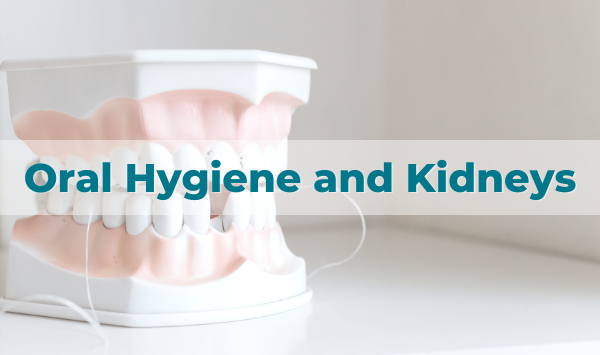
Published on September 7, 2021 | What’s the connection between oral hygiene and kidneys? Many people with chronic kidney disease also have gum (or periodontal) disease. The good news is that increased attention to dental hygiene can keep your teeth, gums, and all of you healthier.
Oral Hygiene and Kidneys
If your teeth aren’t properly cleaned, bacteria in your mouth may enter your body’s systems. This can cause inflammation and problems for your kidneys, says Sandra Molinas, D.D.S., M.A., a periodontist at Mount Sinai Hospital in New York City. Kidney disease weakens the immune system, making you more susceptible to infections.
This makes vigilant dental care especially important. According to Dr. Molinas, people with PKD should be referred to a periodontist so they can be checked for periodontitis, a condition that includes bleeding gums, wobbly teeth, and possible tooth loss.
But in the meantime, follow these guidelines to maintain a healthy mouth.
See your dentist every four months.
“We want to prevent disease before it happens,” Dr. Molinas says. Regular care is an important step in keeping track of your oral hygiene and kidneys.
Floss, but avoid Waterpiks.
Dental floss is essential for a healthy mouth. But beware of devices that shoot water between your teeth. “They can actually drive food deeper into the gums if you do have periodontal disease,” Dr. Molinas says.
Brush for at least two minutes twice a day.
Play your favorite song while brushing to ensure you thoroughly clean your teeth. Dr. Molinas also recommends using an electric toothbrush.
Avoid sugary and sticky foods.
“These foods cause plaque and plaque can build up,” leading to tooth decay and gum disease, says Ellyne Dombro, a registered dental assistant in Cherry Hill, New Jersey, who has PKD. If you do indulge, rinse your mouth immediately to clear away sticky bacteria. Even better: Listerine. “It’s the best mouthwash to use because it actually kills bacteria,” Dr. Molinas says. Use it at full strength and rinse for a full 30 seconds. The alcohol-free formula is just as effective.
Chew sugarless gum.
Chewing sugarless gum between meals increases saliva production and helps rid your teeth of bacteria, Dombro says.
Communicate with your dentist.
Let your dentist know what medications you’re taking; if you’re on dialysis, have dry mouth, or loose teeth; or if anyone in your family has gum disease. Your dentist may prescribe antibiotics before a procedure to reduce your infection risk, Dr. Molinas says.
If you’re a transplant patient, take special care. Anti-rejection medications can make gums puffy and vulnerable to infection. See your periodontist as soon as possible for special monitoring. If you have questions about how oral hygiene affects PKD, always check with your dentist or periodontist.
Want to see more articles like this? Read the full issue of our magazine, PKD Life, and subscribe to future issues here.









Pkd rene policistico. Trapianto di rene da 10 anni. Ho 67 anni. Ho fatto impianti dentali, solo i superiori tengono, quelli inferiori sono caduti. Posso tentare ancora l’impianto dentale inferiore o è consigliato accontentarsi di un ponte mobile? Graziemille
Can I use chlorhexidine 0.12% rinse with ckd?